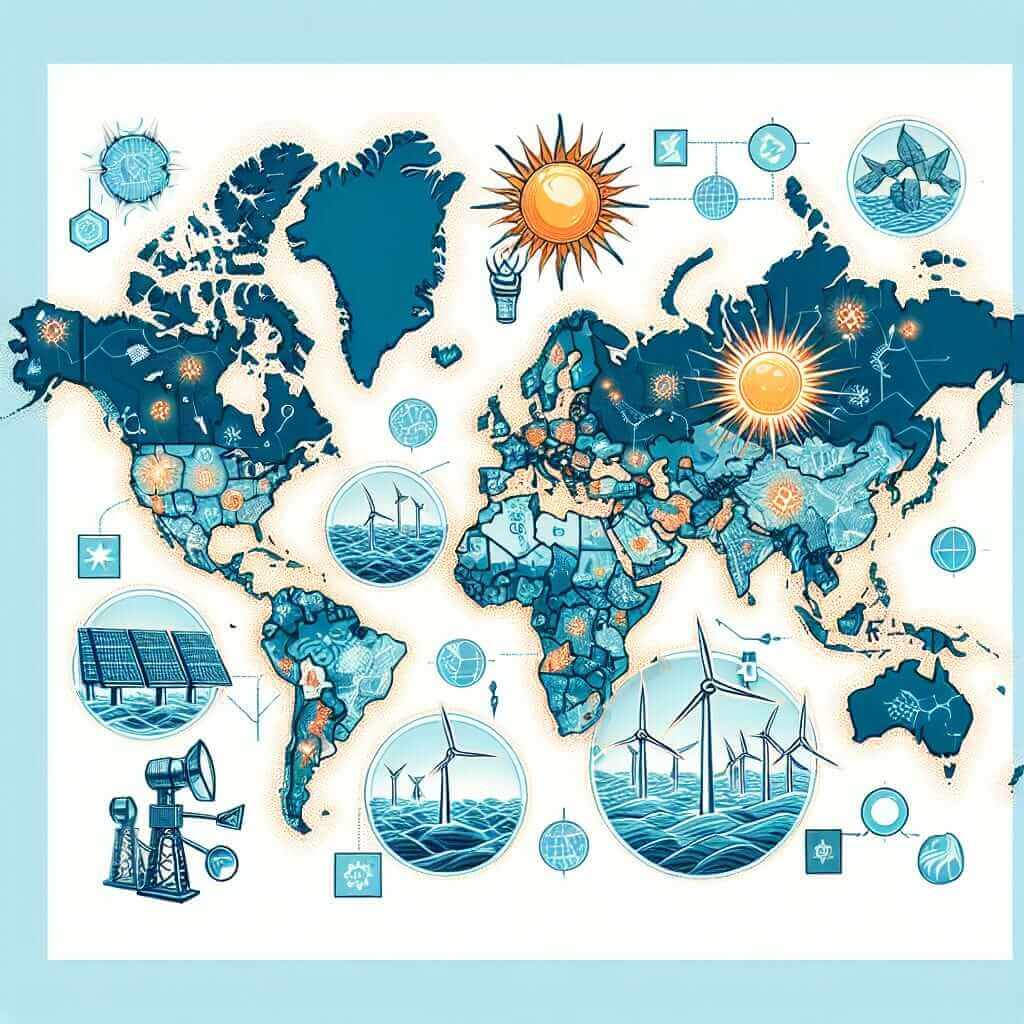The Reading section of the IELTS exam often presents candidates with passages that reflect current global issues and widespread trends, requiring both comprehension and analytical skills. One pertinent and contemporary topic is the impact of renewable energy adoption on international relations. Given the increasing emphasis on sustainable practices worldwide, this subject has appeared in several IELTS reading tests and is likely to recur in future exams due to its ongoing relevance.
Main Content
IELTS Reading Practice Test – Medium Text
The following is an IELTS Reading practice test. Please read the passage carefully and answer the questions that follow.
Renewable Energy Adoption and Its Ripple Effect on International Relations
As the global community increasingly turns to renewable energy sources to address climate change and energy security, the geopolitical landscape is undergoing significant transformation. Traditional reliance on fossil fuels has long dictated the power dynamics among countries. However, the shift towards wind, solar, and hydroelectric power is redistributing influence and fostering new alliances.
Countries rich in renewable resources are becoming pivotal players on the world stage. For instance, nations with abundant sunlight like those in the Middle East and Africa, or with extensive coastlines like those in South America and Southeast Asia, are emerging as energy hubs. This transition is reshaping regional relations and often leading to collaborations between developed and developing nations for technology transfer and investment in infrastructure.
Moreover, the adoption of renewable energy impacts the economic policies of fossil fuel-dependent countries. Many of these countries are now investing in renewable technologies to diversify their economies and reduce their vulnerability to fossil fuel market volatility. This shift is evident in major oil-exporting countries, which are increasingly viewing renewable energy as a means to hedge against future uncertainties.
Interestingly, renewable energy is also mitigating some international conflicts. Disputes over water resources, for example, are being addressed through innovative transboundary hydroelectric projects that benefit multiple countries. However, the competition for rare earth elements, essential for renewable technologies, has introduced new geopolitical tensions, particularly between major economic powers like the United States and China.
In summary, while renewable energy adoption promotes global cooperation and environmental sustainability, it also introduces new challenges and reshapes traditional power structures. As countries navigate this transition, international relations will continue to evolve in response to the changing energy paradigm.
Questions
Multiple Choice
-
What is the primary effect of the shift towards renewable energy on international relations?
- A. It creates economic disparities.
- B. It fosters new geopolitical alliances.
- C. It keeps the power dynamics unchanged.
- D. It leads to the decline of developed nations.
-
How are fossil fuel-dependent countries responding to the rise of renewable energy?
- A. By increasing oil production.
- B. By investing in renewable technologies.
- C. By ignoring the renewable trend.
- D. By reducing their economic policies.
Identifying Information (True/False/Not Given)
- The passage states that renewable energy adoption is reducing the importance of fossil fuels. (True/False/Not Given)
- Renewable energy sources only benefit developed nations. (True/False/Not Given)
Matching Information
Match the following countries with their respective renewable energy potentials.
5. Middle Eastern nations
6. Southeast Asian nations
- A. Abundant sunlight
- B. Extensive coastlines
Answer Keys
-
B – It fosters new geopolitical alliances.
- Explanation: The text clearly mentions that countries rich in renewable resources are becoming pivotal players on the world stage, fostering new collaborations.
-
B – By investing in renewable technologies.
- Explanation: The text indicates that fossil fuel-dependent countries are investing in renewable technologies to diversify their economies.
-
True – The passage states that fossil fuel reliance is being overtaken by renewable sources.
-
False – The passage mentions benefits to both developed and developing nations through collaboration.
-
A – Abundant sunlight is linked to Middle Eastern nations.
-
B – Extensive coastlines are linked to Southeast Asian nations.
Common Mistakes
One common error in this type of reading passage is focusing too narrowly on the details rather than understanding the overall impact mentioned. Another issue is misinterpreting the implications of renewable energy on international relations by not recognizing the geopolitical shifts highlighted.
Vocabulary
-
Geopolitical (adj)
- /ˌdʒiːoʊˌpəˈlɪtɪkəl/
- Related to the influence of geographic factors on politics.
- The geopolitical landscape is reshaping due to renewable energy adoption.
-
Infrastructure (n)
- /ˈɪnfrəstrʌktʃər/
- The basic physical structures needed for the operation of a society.
- Investment in renewable infrastructure is growing globally.
Grammar
Complex Sentences:
- Structure: [Independent Clause] + [Dependent Clause]
- Example: “As the global community increasingly turns to renewable energy sources, the geopolitical landscape is undergoing significant transformation.”
Advice for High IELTS Reading Scores
- Practice Regularly: Familiarize yourself with different question types through regular practice.
- Enhance Vocabulary: Expand your academic and topic-specific vocabulary.
- Develop Skimming and Scanning Skills: Learn to quickly identify key points and details.
- Understand Question Types: Be adept at distinguishing between different IELTS reading question types.
- Time Management: Practice completing passages within the allocated time effectively.

By understanding the relationship between renewable energy adoption and international relations, you’ll not only enhance your knowledge for the IELTS Reading section but also gain insight into a crucial global issue.